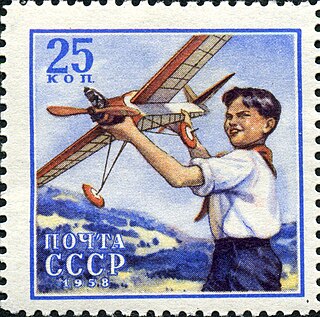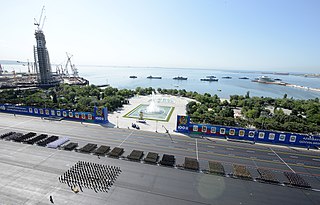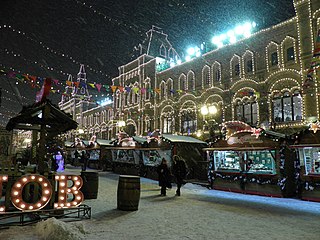
Labour Day is an annual day of celebration of the achievements of workers. It has its origins in the labour union movement, specifically the eight-hour day movement, which advocated eight hours for work, eight hours for recreation, and eight hours for rest.

Mother's Day is a celebration honoring the mother of the family or individual, as well as motherhood, maternal bonds, and the influence of mothers in society. It is celebrated on different days in many parts of the world, most commonly in March or May. It complements similar celebrations honoring family members, such as Father's Day, Siblings Day, and Grandparents' Day.

The Great Patriotic War is a term used in Russia and some other former republics of the Soviet Union to describe the conflict fought during the period from 22 June 1941 to 9 May 1945 along the many fronts of the Eastern Front of World War II, primarily between the Soviet Union and Nazi Germany. For some legal purposes, this period may be extended to 11 May 1945 to include the end of the Prague offensive.
The Soviet calendar was a modified Gregorian calendar that was used in Soviet Russia between 1918 and 1940. Several variations were used during that time.

Victory in Europe Day is the day celebrating the formal acceptance by the Allies of World War II of Germany's unconditional surrender of its armed forces on Tuesday, 8 May 1945; it marked the official end of World War II in Europe in the Eastern Front, with the last known shots fired on 11 May.

Victory Day is a holiday that commemorates the Soviet Union victory over Nazi Germany in 1945. It was first inaugurated in the 15 republics of the Soviet Union following the signing of the German Instrument of Surrender late in the evening on 8 May 1945. The Soviet government announced the victory early on 9 May after the signing ceremony in Berlin. Although the official inauguration occurred in 1945, the holiday became a non-labor day only in 1965.

Children's Day is a commemorative date celebrated annually in honour of children, whose date of observance varies by country. In 1925, International Children's Day was first proclaimed in Geneva during the World Conference on Child Welfare. Since 1950, it is celebrated on June 1 in many Second World countries. World Children's Day is celebrated on 20 November to commemorate the Declaration of the Rights of the Child by the UN General Assembly on 20 November 1959. In some countries, it is Children's Week and not Children's Day. The Sikhs celebrate Children Day on 20 December to 27 December. In the U.S., Children's Day is celebrated in may 20th 2024

Several nations observe or have observed a Navy Day to recognize their navy.

An Armed Forces Day, alongside its branch-specific variants often referred to as Army or Soldier's Day, Navy or Sailor's Day, and Air Force or Aviator's Day, is a holiday dedicated to honoring the armed forces, or one of their branches, of a sovereign state, including their personnel, history, achievements, and perceived sacrifices. It's often patriotic or nationalistic in nature, carrying propaganda value outside of the conventional boundaries of a military's subculture and into the wider civilian society. Many nations around the world observe this day. It is usually distinct from a Veterans or Memorial Day.

The following is the list of official public holidays recognized by the Government of Russia. On these days, government offices, embassies and some shops, are closed. If the date of observance falls on a weekend, the following Monday will be a day off in lieu of the holiday.

Russian culture has been formed by the nation's history, its geographical location and its vast expanse, religious and social traditions, and both Eastern and Western influence. Russian writers and philosophers have played an important role in the development of European thought. The Russians have also greatly influenced classical music, ballet, sport, painting, and cinema. The nation has also made pioneering contributions to science and technology and space exploration.

New Year trees are decorated trees similar to Christmas trees that are displayed to specifically celebrate the New Year. They should not be confused with the practice of leaving up a Christmas tree until after New Year's Day. New Year trees are common in various cultures and nations, chiefly the former Soviet Union, former Yugoslavia, Turkey, China and Vietnam.

Maslenitsa, also known as Butter Lady, Butter Week, Crepe week, or Cheesefare Week, is an Eastern Slavic religious and folk holiday which has retained a number of elements of Slavic mythology in its ritual. It is celebrated during the last week before Great Lent; that is, the eighth week before Eastern Orthodox Pascha.

Defender of the Fatherland Day is a holiday observed in Russia, Turkmenistan, Belarus, Kyrgyzstan, Kazakhstan and Tajikistan. It is celebrated on 23 February, except in Kazakhstan, where it is celebrated on 7 May. Ukraine abolished the holiday starting 1992 and, after the Revolution of Dignity, has instated the somewhat similar Defender of Ukraine Day on 1 October.
Grandparents' Day or National Grandparents' Day is a secular holiday celebrated in various countries; it is celebrated to show the bond between grandparents and grandchildren. It occurs on various days of the year, either as one holiday or sometimes as a separate Grandmother's Day and Grandfather's Day. It was celebrated for the first time in Poland in 1965.

Tushino was a former general aviation airfield located in Tushino, northwest Moscow, Russia. During the Cold War, this was the site of military exercises showcasing the latest in Soviet innovation. These exercises were held on Soviet Air Fleet Day. Nowadays, the grounds are the site of the Otkritie Arena, the home of FC Spartak Moscow, one of Russia's leading football clubs.

International Workers' Day, also known as Labour Day in some countries and often referred to as May Day, is a celebration of labourers and the working classes that is promoted by the international labour movement and occurs every year on 1 May, or the first Monday in May.

Christmas in Russia, called Е́же по пло́ти Рождество Господа Бога и Спа́са нашего Иисуса Христа in the Russian Orthodox Church, is a holiday commemorating the birth of Jesus Christ. It is celebrated on the 25th of December on the Julian calendar, which corresponds to 7th of January on the Gregorian calendar. It is considered a high holiday by the church, one of the 12 Great Feasts, and one of only four of which are preceded by a period of fasting. Traditional Russian Christmas festivities start on Christmas Eve, which is celebrated on 6 January [O.S. 24 December].
The Day of Sea and River Fleet Workers or the Sea and River Fleet Worker's Day – a professional holiday of sea and river fleet workers in the USSR, which was celebrated annually on the first Sunday of each July since 1981.

The Day of the Workers of the Ukrainian Navy, also known as Navy Day, is a holiday in Ukraine. The holiday celebrates the founding of the Ukrainian Navy. Navy Day is a professional holiday that is celebrated on every first Sunday of July.
















